Florida Research and Development Tax Credit Summary
Florida offers a Research and Development (R&D) Tax Credit for qualified activities within the state, as long as the corporation qualifies for and claims the federal R&D credit under IRC §41. Only corporations in the following targeted industries may claim the Florida research credit:
-
- Life Sciences
- Information Technology
- Aviation/Aerospace
- Homeland Security/Defense
- Cloud Information Technology
- Marine Sciences
- Materials Science
- Nanotechnology Industries
- Manufacturing
- Credit is limited to C Corporations only.
- "Qualified research expenses" (QREs) have the same meaning as in IRC § 41, except that such expenses must be for research conducted within Florida.
- The Florida R&D credit is equal to 10% of the QREs in Florida that exceed a base amount. The base amount is the average of the QREs in Florida for the 4 tax years before the tax year for which the credit is being calculated.
- For a corporation that has not been in existence for at least 4 years before it claims the credit, the credit is reduced by 25% for each year that the corporation did not exist.
- A company must claim a federal credit in order to claim a Florida credit.
- The credit is limited to 50% of a corporation’s net income tax liability after all other credits have been applied in the priority order set by Florida law.
- The annual credit cap for all taxpayers is $9 million. If the state credit cap is reached, the credits are allocated to each qualified applicant on a prorated basis.
- To claim the Florida research credit, corporations must apply for an allocation of the Florida R&D credit. The application form must be completed and submitted electronically to the Florida Department of Revenue (DOR) between March 20 and March 26 each calendar year the credit is available. The application must include a letter from the Department of Commerce (DOC) certifying that the corporation is an eligible qualified target industry business.
- Excess credits may be carried forward up to 5 years.
- A company must be certified by the Department of Economic Opportunity as a qualified target business industry, including:
- Life Sciences
- Information Technology
- Aviation/Aerospace
- Homeland Security/Defense
- Emerging Technologies
- Cloud Information Technology
- Marine Sciences
- Materials Science
- Nanotechnology Industries
- Manufacturing
Florida R&D Tax Credit Case Study
An Orlando company designs and develops component parts for the aviation industry, a qualified target business industry for Florida's R&D tax credit. The Company started R&D in 2017 and claims R&D credits each year for the development activities of its engineers. The company submits its application and is awarded an R&D credit for the 2021 tax year. Prior year Florida QREs for 2017, 2018, 2019, and 2020 are as follows: $600,000, $700,000, $800,000, and $900,000, respectively. The Federal credit calculated below is utilizing the Alternative Simplified Method.
|
FEDERAL
|
FLORIDA
|
|||||
|
Year
|
Total QREs
|
Credit
|
Total QREs
|
Credit
|
||
|
2021
|
$1,000,000
|
$84,000
|
$1,000,000
|
$25,000
|
||
You can read more about this Florida tax credit case study here.
Four-Part Test
Qualified research activities are defined by the four-part test outlined below
Technological in Nature
Activities must fundamentally rely on the principles of physical or biological science, engineering, or computer science.Permitted Purpose
Activities must be performed in an attempt to improve the functionality, performance, reliability, or quality of a new or existing business component.Eliminate Uncertainty
Activities intended to discover information that could eliminate technical uncertainty concerning the development or improvement of a product.Experimentation
All activities must include a process of experimentation including testing, modeling, simulating, and systematic trial and error.Research and Development Tax Insights
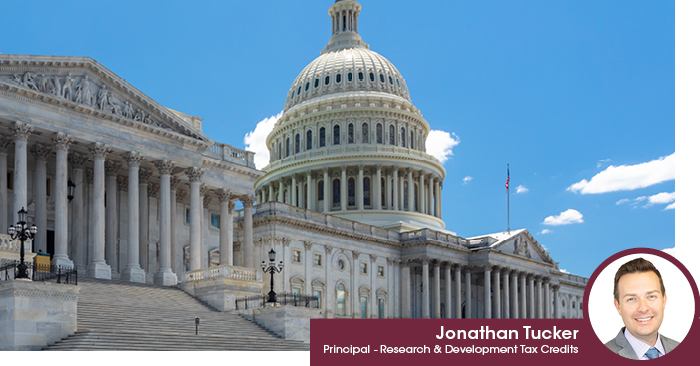
Retroactive and Permanent R&D Expensing Restored Under Proposed Senate Legislation
06/17/2025Follow KBKG on Social Media Linkedin Facebook X-twitter Youtube By Jonathan Tucker | Principal, Research & Development Tax Credits The Senate Finance Committee has proposed a significant change to the way U.S. businesses deduct their research and development (R&D) expenses. If passed, the bill would reverse a major change that took effect in 2022 based on … Read More

California Senate Bill 711 Proposes Simplified R&D Credit Method
06/10/2025Follow KBKG on Social Media Linkedin Facebook X-twitter Youtube By Tetyana Guguchkina, Elise Rhee, & Michael Maroney | Research & Development Tax Credits California is poised to overhaul its R&D Tax Credit with Senate Bill 711 (SB 711), which proposes replacing the state’s Alternative Incremental Research Credit (AIRC) with a new Alternative Simplified Credit (ASC) … Read More
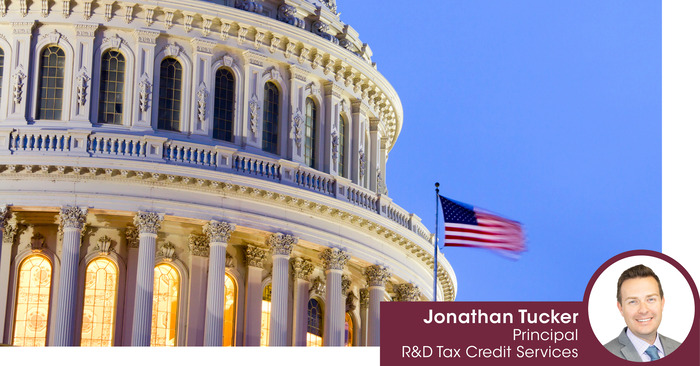
House Narrowly Passes Major GOP Tax Bill 215–214, Senate Signals Revisions Ahead
05/22/2025Follow KBKG on Social Media Linkedin Facebook X-twitter Youtube By Jonathan Tucker | Principal, Research & Development Tax Credits Just after midnight on Thursday, May 22, 2025, a full House debate on the multi-trillion-dollar tax bill began, and the House narrowly passed this sweeping tax and spending package dubbed the “One Big Beautiful Bill Act” with … Read More
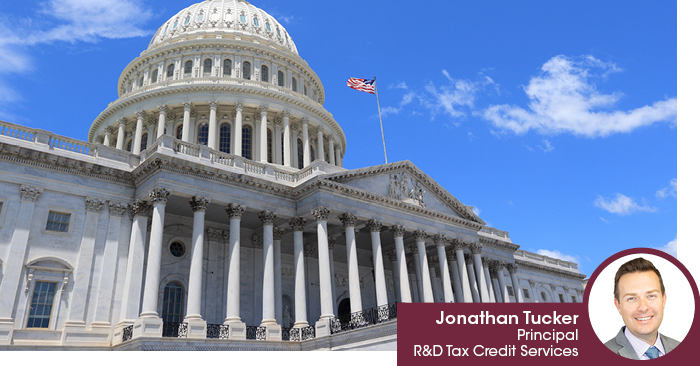
House Committee Advances Major GOP Tax Bill Amid Internal GOP Divisions
05/19/2025Follow KBKG on Social Media Linkedin Facebook X-twitter Youtube By Jonathan Tucker | Principal, Research & Development Tax Credits On May 18, 2025, the House Budget Committee narrowly approved a major tax and spending package dubbed the “One Big Beautiful Bill Act” with a 17-16 vote. Four Republicans voted “present,” highlighting growing tension within the party … Read More
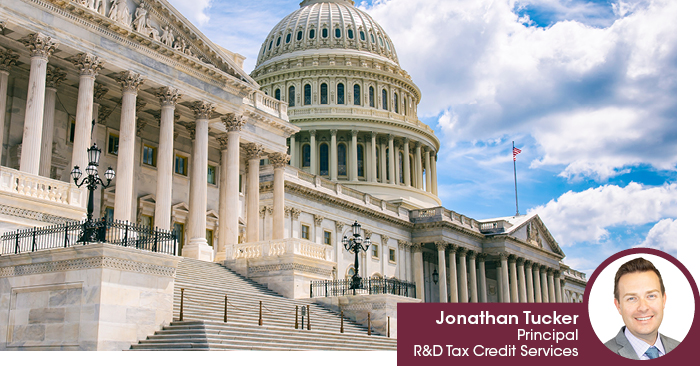
Senate Reacts to Key Provisions from House Tax Bill, Eyeing Permanent R&D Expensing
05/16/2025Follow KBKG on Social Media Linkedin Facebook X-twitter Youtube By Jonathan Tucker | Principal, Research & Development Tax Credits Important developments recently came out of Congress related to the House’s ongoing reconciliation efforts, specifically around tax provisions that impact businesses directly, most notably, research and development (R&D) expensing. At a recent Tax Council Policy Institute conference, … Read More
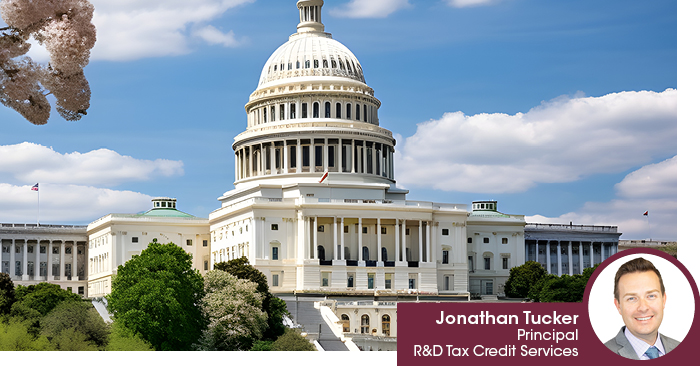
House Tax Bill Prioritizes 174 R&D Amortization Fix, Bonus Depreciation, SALT Cap, and more
05/13/2025Follow KBKG on Social Media Linkedin Facebook X-twitter Youtube By Jonathan Tucker | Principal, Research & Development Tax Credits On May 12, 2025, the House Ways and Means Committee released a larger text than what Chairman Jason Smith (R-MO) released on May 9 for proposed tax legislation as part of the FY 2025 budget reconciliation process. … Read More

The Case for Human Expertise in your R&D Tax Credits
04/29/2025In a world increasingly driven by automation, it’s tempting to turn to Artificial Intelligence (AI) powered solutions for complex tasks, even something as nuanced as claiming R&D tax credits. While AI can be a powerful tool, when it comes to maximizing your R&D tax credit claim, human expertise of a trusted advisor is not just … Read More
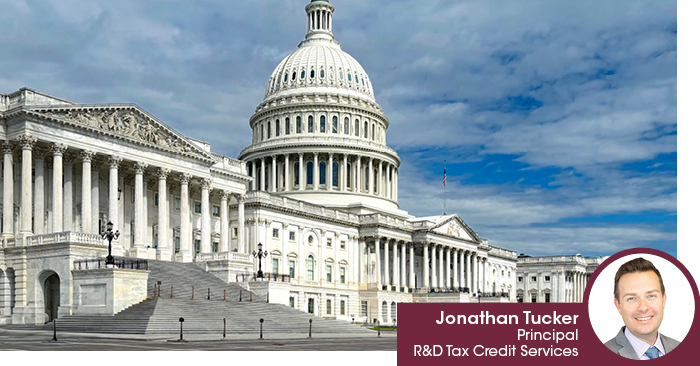
House Passes 2025 Budget Resolution, Paving Way for Tax and Spending Reform
04/10/2025Follow KBKG on Social Media Linkedin Facebook X-twitter Youtube By Jonathan Tucker | Principal, Research & Development Tax Credits On April 10, 2025, the U.S. House of Representatives approved the final version of the Fiscal Year (FY) 2025 budget resolution (H. Con. Res. 14) by a razor-thin margin of 216 to 214, which will incorporate amendments … Read More
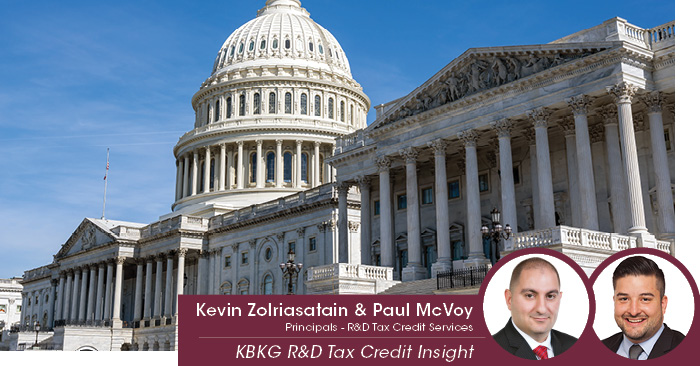
Lawmakers Introduce Bill to Retroactively Fix R&D 174 Expensing
03/14/2025By Kevin Zolriasatain and Paul McVoy | Principals, Research & Development Tax Credits On March 10, 2025, a bipartisan group of lawmakers introduced the American Innovation and R&D Competitiveness Act of 2025 in the U.S. House of Representatives. The legislation aims to restore the immediate deductibility of research and experimental (R&E) expenditures and reverse the amortization requirement imposed … Read More
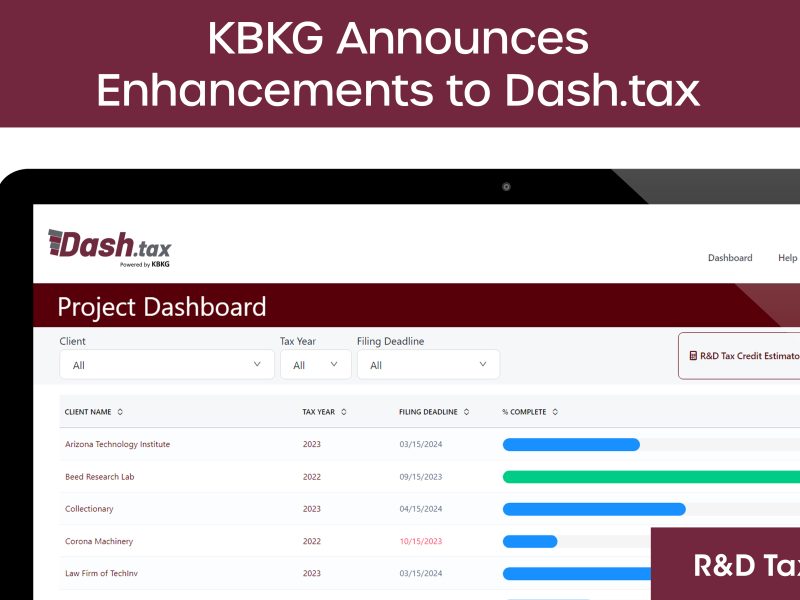
KBKG Announces Enhancements to Dash.tax, Streamlining R&D Tax Credit Claims for CPAs, Startups, and Small Businesses
03/04/2025PASADENA, Calif. – March 4, 2025– KBKG, a leader in tax credits and incentives solutions, has introduced significant enhancements to Dash.tax, its innovative tax automation platform designed for CPAs, startups, and small businesses. The latest updates further streamline the process of claiming R&D tax credits, ensuring businesses can efficiently apply credits to payroll taxes, maximize … Read More


